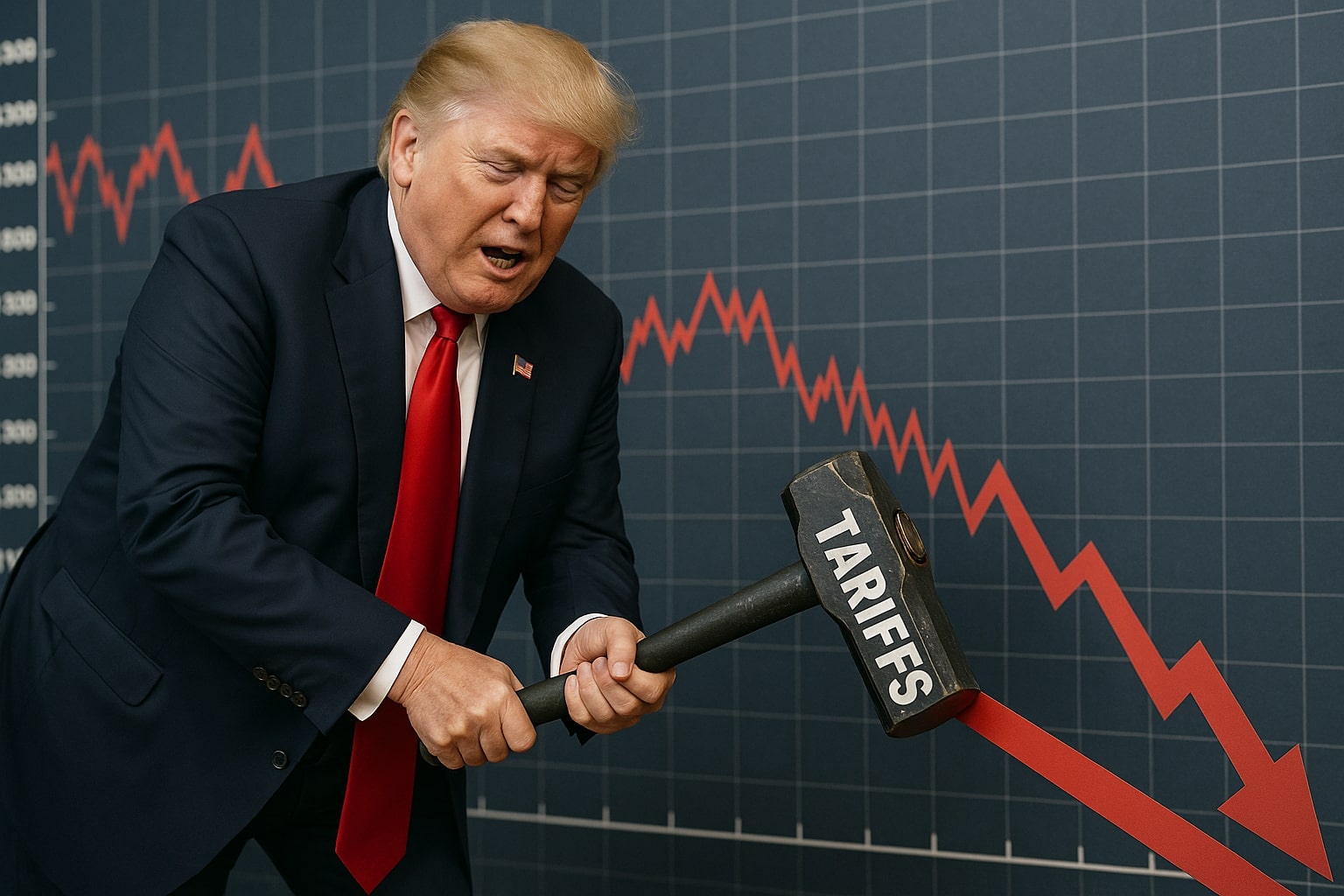
U.S. Stock Market Takes a Hit as Trump's Tariffs Spark Trade Concerns: What’s Next for Investors?
With Brent Crude prices tumbling below $60 and Trump's new tariff threats, how will investors navigate a volatile market? | That's TradingNEWS
The Latest Market Trends and Their Impact on Key Stocks: Dow, S&P 500, Oil, and Tariff Announcements
Wall Street's momentum took a hit as global trade tensions rose following a surprise tariff announcement by President Donald Trump. The Dow Jones Industrial Average dropped by 155 points, or 0.4%, while the S&P 500 saw a similar decline of 0.7%. The Nasdaq Composite dropped about 0.8%, reflecting a broader market pullback.
The Impact of Trump's New Tariffs on Film Industry Stocks
President Trump’s announcement of a 100% tariff on movies produced outside of the United States caught investors off guard, significantly impacting stocks tied to the media and entertainment industry. Companies like Netflix (NFLX), Walt Disney (DIS), Warner Bros Discovery (WBD), and Paramount Global (PARA) faced sharp declines following this news. Netflix saw a 4% drop, while Disney saw a 2% decrease. The film industry, particularly Hollywood, has been dealing with an increasing number of film productions moving abroad due to more favorable tax incentives. Trump's aggressive move to protect the domestic industry could further complicate the dynamics of global film production.
Tech Stocks and Market Outlook: Why Traders are Wary
As the market awaits crucial updates from the Federal Reserve, investors are cautious. With the Fed’s two-day policy meeting starting on Tuesday, there's speculation about whether the Fed will hold steady with interest rates amid growing global uncertainty. The Nasdaq Composite led the declines in early trading, and the overall sentiment in the tech sector is tepid, especially with concerns around tariffs affecting tech companies’ supply chains.
The S&P 500 is experiencing its first decline after a nine-day winning streak, the longest since November 2004. Despite these recent gains, the looming uncertainty surrounding tariff policies and a potential trade war with China has overshadowed investor optimism. Apple (AAPL), Amazon (AMZN), and Ford (F) are among the key stocks reporting earnings this week, and all eyes will be on how their results reflect the impact of the tariffs.
Berkshire Hathaway's Leadership Transition and Market Reactions
Shares of Berkshire Hathaway (BRK-B, BRK-A) took a hit following Warren Buffett’s announcement that he will step down as CEO by the end of the year. This marks the beginning of a long-expected leadership transition, with Greg Abel set to take over as CEO. However, Buffett will remain as chairman, and the impact on the stock remains to be seen. Berkshire’s stock dropped by about 3% in pre-market trading following the news.
Oil Market Shifts: OPEC+ Production Surge and Falling Prices
The oil market also experienced volatility, with both Brent Crude Oil (BZ=F) and West Texas Intermediate Crude (CL=F) falling by over 3% in early trading. The new OPEC+ decision to increase production by 411,000 barrels per day in June is putting pressure on oil prices, which have already fallen more than 20% this year. The decision follows a similar agreement in May, and as oil futures drop, this signals a shift in the market that could affect inflation expectations.
As Brent Crude prices fall to $59.25 per barrel and WTI Crude prices drop to $56.19 per barrel, analysts are adjusting their price forecasts, with Goldman Sachs lowering its WTI forecast to $56 for the remainder of 2025. This move by OPEC+ to boost production could be seen as an effort to counterbalance rising supply concerns, but it’s clear that the global oil market remains unstable amid political and economic factors.
Skechers' Acquisition News and Stock Surge
Meanwhile, Skechers (SKX) saw a dramatic rise of over 25% after news broke that the footwear company would be acquired by 3G Capital for $63 per share. This deal represents a 30% premium on Skechers' current stock price and values the company at approximately $9.4 billion. The news was a strong boost for Skechers shareholders, but it also points to the ongoing trend of consolidation in the retail sector.
Tyson Foods and the Impact of Trade Tariffs on Consumer Goods
Tyson Foods (TSN) reported earnings that exceeded expectations, but the stock still dropped by nearly 2% in premarket trading after missing revenue estimates. Despite robust growth in its frozen meat and ready-to-eat food segments, Tyson faces ongoing pressure due to Trump’s tariff policies, particularly around beef prices and international exports. The company has warned that future disruptions in the trade landscape could lead to further challenges in its international sales.
What Are the Risks for Investors in a Volatile Market?
With uncertainty surrounding trade tensions, the upcoming Federal Reserve meeting, and the effects of Trump's tariffs, what’s next for investors? The markets are clearly on edge, with high volatility expected to continue as traders await further guidance on economic policies. The risk of further declines in sectors like media, oil, and tech is high, but the question remains: will the Fed’s actions provide clarity or exacerbate market fears?
The broader market also faces challenges with inflation and rising commodity prices, along with geopolitical risks. While some stocks, like Skechers, show potential for positive movement, others are at risk of significant downturns. Traders will need to stay vigilant in navigating this turbulent market environment.
Market Sentiment and the ‘Sell in May’ Trend
The age-old investment adage "sell in May and go away" is also being discussed as Wall Street faces another period of volatility. Historical data suggests that the period between May and October tends to be weaker for stocks, but this year’s market sentiment is driven more by political and trade concerns rather than traditional seasonal trends. The uncertainty surrounding Trump’s tariff actions, the Fed’s next steps, and trade discussions with China could turn what is typically a weak season into one of heightened volatility.
Global Currency Movements: Asian Currencies Strengthen Against the Dollar
On the global stage, Asian currencies showed signs of strength, with the Taiwanese Dollar appreciating 5.77% against the U.S. dollar, hitting a three-year high. The offshore Chinese Yuan also strengthened slightly, while the Australian and Singapore dollars posted modest gains. The strength of these currencies is a sign of regional confidence as the U.S. dollar weakens amid ongoing global trade discussions.
In conclusion, this week’s market movements are a result of a complex interplay between domestic and international factors. Tariffs, currency fluctuations, and the actions of central banks will continue to influence the market, but it remains to be seen whether the current downward trend will reverse or if investors will face further challenges.
That's TradingNEWS
Read More
-
GPIQ ETF Price Forecast: Can a 10% Yield at $52 Survive the Next Nasdaq Selloff?
09.02.2026 · TradingNEWS ArchiveStocks
-
XRP ETF Price Forecast: XRPI at $8.32, XRPR at $11.86 as $44.95M Inflows Defy BTC and ETH Outflows
09.02.2026 · TradingNEWS ArchiveCrypto
-
Natural Gas Futures Price Forecast: Will The $3.00 Floor Hold After The $7 Winter Spike?
09.02.2026 · TradingNEWS ArchiveCommodities
-
Stock Market Today: Dow Back Under 50K While S&P 500 and Nasdaq Push Higher as Gold Reclaims $5,000
09.02.2026 · TradingNEWS ArchiveMarkets
-
USD/JPY Price Forecast: Can Bulls Clear 157.5 Without Triggering a 160 Intervention Line?
09.02.2026 · TradingNEWS ArchiveForex


















